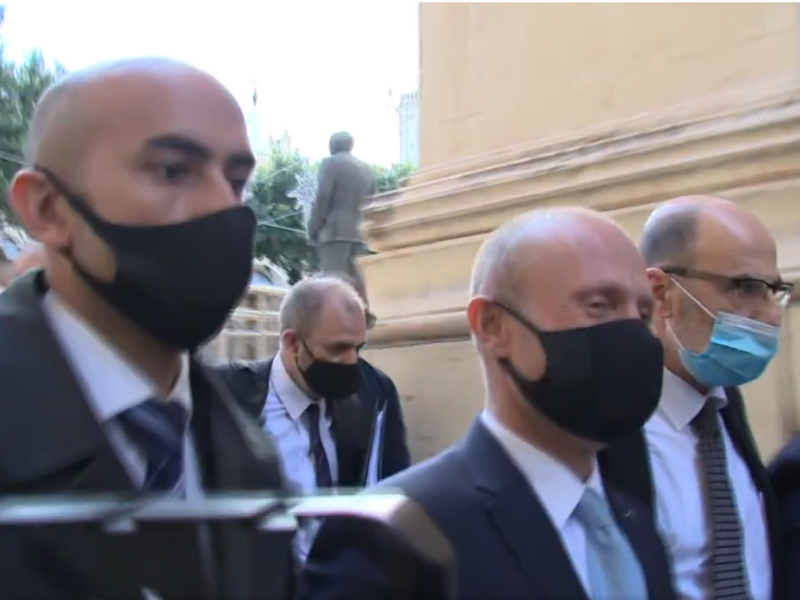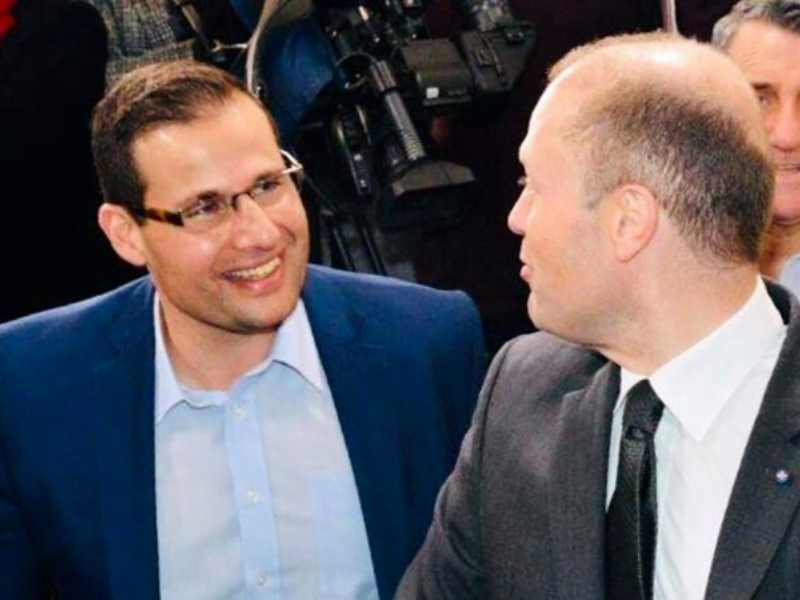The Council of Europe has called on the Maltese government to “refrain from any attempt to impose an arbitrary time-limit” on the work of the independent public inquiry into Daphne Caruana Galizia’s assassination after Prime Minister Robert Abela insisted it should end next week.
Malta’s implementation of Assembly recommendations on ensuring justice for Caruana Galizia and strengthening the rule of law remain “fundamentally unsatisfactory, with no final results”, the Assembly’s Legal Affairs Committee said in a statement endorsing a follow-up report by its rapporteur Pieter Omtzigt made public as his mandate comes to an end.
The Council of Europe’s report comes after Abela followed disgraced former Prime Minister Joseph Muscat’s testimony before the public inquiry last Friday in which the 2019 winner of OCCRP’s most corrupt politician attempted to ‘lecture’ the Judges on how to do their job.
Much of what was reported about disgraced former Prime Minister Joseph Muscat’s testimony focused on what he said about the inquiry that was “noteworthy”. Yet insidious concepts are being overlooked.
Following the media coverage Muscat’s appearance generated, many would be forgiven for thinking that this was exclusively Muscat at work, but if we take a step back and cancel the noise we can begin to see how a lot of the groundwork for Muscat’s disinformation theatrics had already been laid by his successor and the various Labour Party propaganda vehicles.

Joseph Muscat’s arrival at the public inquiry on 4 December, accompanied by his lawyers, assistants and bodyguards.
The first move to threaten the future of the public inquiry was when Abela informed the board that he will only grant a “one-time” extension for the board to conclude its investigation, a time that is now set to expire in mid-December. Abela defended this stance by claiming that prolonging the inquiry would only cause further damage.
He reinforced this last Monday despite objections by international press freedom organisations, the Caruana Galizia family, Opposition members and the Council of Europe’s Special Rapporteur Pieter Omtzigt.
Now, the Council of Europe has slammed Malta on its failure to implement recommended reforms and insisted the public inquiry must be allowed to run its course.
Clearing the path for disinformation
Labour Party mouthpieces added their own two cents to help disinform the public, calling the inquiry a waste of time and that it is biased against them. Labour Party whip Glenn Bedingfield claimed that the inquiry “was allowed to turn into a political exercise”.
“The aim of the inquiry is to establish facts, not conjectures that are prolonging the process and leading to extension requests. If they were to concentrate on their terms of reference there would be no need for further extensions unless their requests are due to ulterior motives,” he added.
https://www.facebook.com/bedingfieldg/posts/2379886215653425
That same line, that the inquiry should be “based on facts” was repeated on Muscat’s Facebook page while he was testifying on Friday.
It’s a line that former minister Konrad Mizzi used while trying to justify his refusal to appear in front of the board of inquiry and subsequently, his refusal to answer any questions. He said he had “no duty to allow [his] political assassins to profit from the public inquiry”.
Muscat went a step further, deliberately sowing confusion about the nature of the State and the history of the State.
L’état, c’est moi? Not quite
In the list of grievances Muscat foisted upon his hapless audience was the idea that the “inquiry still failed miserably, since it is the State which should have been investigated. Instead, it is the current government only which was investigated. The Maltese State did not start in 2013″.
He goes on to add that “the 2013 arbitrary deadline goes against the grain of the more ample attitude used elsewhere” and that the State “is not just the government. Apart from the Executive, there are also the Legislative and Judicial branches”.
The State is indeed made up of many organs, but it is principally (not exclusively) represented by the executive branch of the government. Why? Because it is the Executive that remains the most powerful. The Executive branch of the State proposes laws to be approved by (and also holds a majority in) parliament (the Legislative) and applied by the courts (the Judicial).
Yet the statement about a 2013 “arbitrary deadline” is a red herring. It is true that nowhere in the inquiry’s terms of reference is the date 2013 mentioned, but does that mean that to investigate a potential failing by the State culminating in the assassination of a journalist in October 2017 one has to start from 21 September 1964?
The only date that matters is 16 October 2017 – the date Caruana Galizia was assassinated. The board remains at liberty to investigate as far back as it deems necessary. It just so happens that there is a concentration of events and behaviour during a particular timeframe in the run up to her death, and it is those events, that behaviour, that have to be addressed first.
The path ahead towards significant change is a long one and justice for Caruana Galizia is just the start, as described by the Assembly’s statement backing Omzigt’s report who concludes that the implementation of Resolution 2293 adopted in June 2019 referring to the rule of law, ending impunity for high-level corruption and justice for Caruana Galizia were all found to be unsatisfactory.
Inquiring about what, exactly?
It is easy to lose sight of the public inquiry’s objective. Each hearing uncovers another layer of corruption and impunity that requires fresh questions.
More witnesses are being added to the roster, and previous witnesses (some of whom could possibly have perjured themselves first time round) are being recalled. No wonder then, that many might mistakenly think that this inquiry is looking solely into the extent of the corruption of State officials, which is why Prime Minister Abela is so eager to wrap it up.
And while Muscat, Abela and their merry men keep trying to conflate criminal activity and the role of the State, they’re missing a key point and one that is set out in the original terms of reference that Abela and Bedingfield are so happy to refer to with gay abandon – points 1 and 3 to be exact. In short, one of the aims of the inquiry is to see whether the State fulfilled its positive obligation of protecting Caruana Galizia’s life.
The public inquiry is there to assess the behaviour of the State, a behaviour that is gauged not on the basis of one or two events but on a series of acts or omissions, over a period of time, a modus operandi, so to speak, and whether these events had bolstered impunity and encouraged and/or allowed others to behave criminally.
What is the ‘positive obligation by the State to protect one’s right to life’?
Article 2 of the European Convention on Human Rights states: “Everyone’s right to life shall be protected by law”.
Put simply, this means that nobody, including the government, can try to end a person’s life. It also means the government should take appropriate measures to safeguard life not only by making the appropriate laws to punish those who kill but also by taking all the necessary and reasonable steps to protect individuals if their life is at risk.
Moreover, if a family member dies in circumstances that suggest the involvement of the State (directly or through its official or unofficial agents), the victim’s family have the right to an independent investigation.
The scope of positive obligations of the State under Article 2 is broad and there is an abundance of case law that covers many contexts such as healthcare, dangerous activities, construction sites and road safety among others. It also includes cases that concern the positive obligations of a State towards the safety of journalists.
Such obligations include taking appropriate and timely preventative measures to secure their safety, and equally important is that any investigations into killings, attacks and mistreatment of journalists must be effective, respecting the key requirements of adequacy, thoroughness, impartiality and independence, promptness and public scrutiny.

Middleman Melvin Theuma with Joseph Muscat’s former chief of staff Keith Schembri.
Notable examples
Take the example of the case that was brought against Russia by the family of Anna Politkovskaya, an investigative journalist who was gunned down in the lift of her Moscow home in 2006. Following the assassination, the Russian authorities had immediately started an investigation and in 2014 five men were tried and convicted for carrying out the murder.
In 2018, the European Court of Human Rights (EctHR) however still ruled that Russia had violated Article 2. The court deemed the investigation into Politkovskaya’s killing inadequate since no efforts had been made by the State to identify the person who had commissioned and paid for the crime.
In 2010, the ECtHR also found a violation of Article 2 against Turkey. This involved Hrant Dink, the editor-in-chief of a Turkish Armenian weekly newspaper whose articles enraged Turkish extreme nationalists. The latter reacted by staging demonstrations, writing threatening letters and even filing a criminal complaint against the journalist. In 2007, Dink was killed as he was leaving his office.
The perpetrator was a 17-year old who was a member of a Turkish ultra-nationalist group already known to the authorities. The court found that the open hostility towards his articles should have given the authorities ample reason to take preventive measures to safeguard Dink’s life.
Two police departments had been informed of the likelihood of an assassination attempt and although the journalist did not request increased protection (given that he couldn’t have known to what extent his life was in danger), the threat was real and imminent. The court found that the State had not taken the reasonable measures available to them to protect him.
Uncomfortable truths
Unsurprisingly, Robert Abela has once again reiterated that the public inquiry should conclude by the end of next week, stating that he had already granted a three-month extension because of delays caused by COVID-19.
Abela’s remarks come a day after the one-year anniversary of the start of the public inquiry. On 6 December, the Daphne Caruana Galizia Foundation issued a statement describing how the public inquiry has made important, visible progress in its mission despite the government’s limited cooperation and highlighted it is only when the public inquiry completes its mission, unhindered and irrespective of how uncomfortable it makes those who bear responsibility, that Malta can begin a process of real change in order to ensure that nothing like this ever happens again.
The public inquiry is one of the most significant political events to have happened on the island since Independence in 1964. The State’s possible failure to protect the life of one of its citizens, despite what the government is trying to tell us, is an extremely serious shortcoming.
The outcome of the public inquiry is one that concerns us all.












I am sure that the inquiry is getting very near to identifying other government stars who are involved in Daphne’s assassination, and possibly direct involvement by Muscat et al. The desperation to end the inquiry is palpable, best if it continues and exposes the fact that we were and still are living in a Mafia led sate.
Criticism is Soooo hard for dictators to stomach.
It-rnejn li huma, JM u Abela, f’kawlata wahda. Il-gustizzja trid turi sniena fuq il-kliem li jwegga’ lill Imhallfin jekk humiex fil-kawlata ukoll. JM mhu xejn jew ma kien xejn hlief, rapresentant ta’vot lejber injorant ghazzien. Indaga u tkun taf meta tahdem fis-settur ta’ servizz. 70% m jafux jaqraw izda jibilghu li jisimghu.
Its all continuity according to bobby of the Mizbla ta’ Kastilja.
ix-xih, l-ex pm maghruf bhala l-artful dodger, jinstab f’Dubai ma siehbu chris cardona; iz-zjara d’Dubai kienet aktart importanti milli jattendi l-qorti u jerga jaghmel priedka mimlija taghwwig u gideb. Is-soltu min ma jattendix jitkaxkar il-qorti mill-pulizija, izda dan l-arrpganti qieghed jaghmel li jrid ghaliex ghandu l-appog tal-awtoritajiet (sic). Shame on all the Maltese institutions.